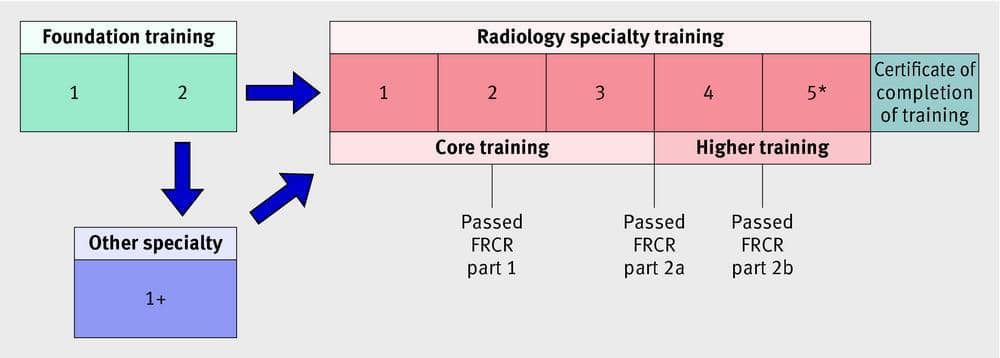Radiology in the UK offers Indian medical graduates a structured, globally recognised pathway to become expert diagnostic specialists. With training programs approved by the National Medical Commission (NMC) and leading to qualifications like the FRCR, the UK has become one of the most sought-after destinations for pursuing radiology abroad. This comprehensive guide helps you understand everything from eligibility and exams to cost of living, MCI/NMC recognised radiology abroad pathways, and career prospects in the UK and India. Whether you’re aiming to pursue MD Radiology abroad or seeking an NMC recognised radiology program, this article will help you make an informed decision. Every year, more Indian MBBS graduates are exploring the idea of specializing in radiology in the UK, not just for the advanced training but also for the global career flexibility it offers. With MCI/NMC recognised radiology abroad routes becoming more streamlined, doctors can now earn world-class credentials while keeping their long-term options open—whether they plan to work in the UK, return to India, or move elsewhere.
Radiology is a rapidly advancing field, critical for modern healthcare, and the UK is a premier destination due to its advanced facilities and structured training. For Indian medical graduates, the appeal lies in the recognition by the National Medical Commission (NMC), formerly MCI, which ensures that qualifications obtained abroad are valid for practice in India. This recognition is pivotal, given the competitive nature of medical education in India and the global demand for skilled radiologists..
Pursuing Radiology in the UK
Radiology training in the UK is a five-year program, starting at ST1 level, with an optional sixth year for subspecialties. Indian graduates need to pass the PLAB exam for GMC registration or opt for sponsorship by GMC approved sponsor and the FRCR for specialty training. The Royal College of Radiologists (RCR) sets the curriculum, ensuring high standards.
One of the most compelling reasons to consider radiology in the UK is the clear pathway to international consultant recognition. With comprehensive curriculum delivery, exposure to state-of-the-art radiological equipment, and guided mentorship, this training is not only intensive but also highly respected across borders. Graduates often praise how closely it aligns with MCI/NMC recognised radiology abroad frameworks.
MCI/NMC Recognition
The NMC recognizes UK post-graduate medical degrees, meaning your radiology training in the UK is valid in India. This is crucial for returning to practice in India, offering flexibility in your career path.
Why Choose Radiology in the UK?
Radiology is at the heart of modern diagnostics, and the UK offers a robust and internationally respected training structure. The NHS (National Health Service) provides a diverse and high-volume clinical setting, allowing trainees to gain experience across all major imaging modalities and specialties. Training here means you’ll be mentored by some of the best radiologists globally, with opportunities to engage in research and education.
Key benefits include:
- International recognition of qualifications
- Access to the Fellowship of the Royal College of Radiologists (FRCR)
- State-of-the-art imaging infrastructure
- Supportive learning environments and mentorship
- Opportunity to work and settle in the UK post-training
In today’s healthcare systems, diagnostic imaging is central to nearly every specialty. Training in radiology in the UK means working in hospitals that are globally renowned for innovation and safety. For Indian doctors, choosing MCI/NMC recognised radiology abroad programs ensures peace of mind when planning future practice in India.
Radiology in the UK: Training Structure and Pathway

Radiology in the UK: Pathways for International Medical Graduates (IMGs)
IMGs have multiple routes to pursue radiology in the UK, all ensuring MCI/NMC recognised radiology abroad credentials:
CCT Route: Traditional Training
Overview: Complete the full 5-year radiology training program. Successful completion results in a Certificate of Completion of Training (CCT) in Radiology.
Eligibility: Note: Applicants with over 18 months of post-internship radiology experience may be considered overqualified for entry-level posts.
CESR-CP Route: For Experienced IMGs
Overview: Suitable for candidates with prior radiology experience starting at ST2 or ST3. Requires a minimum of 4 years of clinical radiology training to qualify for the CCT.
Consideration: This pathway is less standardized and depends on individual hospital recruitment.
CESR Route: Direct Consultant Recognition
Overview: For fully trained radiologists who wish to transition directly into consultant roles. Requires documentary evidence demonstrating equivalent training and experience.
Flexibility: Training components can be from the UK, overseas, or a combination of both, ensuring global recognition. Radiology training in the UK is a run-through program that spans five years (ST1–ST5), with an optional sixth year (ST6) for those pursuing subspecialties like:
- Interventional radiology
- Neuroradiology
- Paediatric radiology
- Musculoskeletal imaging
- Cardiac imaging
These multiple routes allow Indian graduates to align their prior training with the UK’s structured system, making the MCI/NMC recognised radiology abroad pathway more accessible than ever. For those committed to advanced imaging or subspecialties, the optional ST6 year offers the chance to further expertise.
Additional Insights: Radiology Training Pathways and Specialties in the UK
Radiology training in the UK offers multiple clear pathways suited for a range of international medical graduates, ensuring flexibility and recognition through the MCI/NMC framework. The traditional Certificate of Completion of Training (CCT) route spans five years (ST1 to ST5), providing structured specialty training with exposure across all major imaging modalities. For those with prior experience, the Certificate of Eligibility for Specialist Registration Combined Programme (CESR-CP) offers an alternative although limited national-entry points make it less commonly accessed. Radiologists with full specialist qualifications may opt for the CESR route for direct consultant registration.
The specialty training includes the opportunity for an optional sixth year (ST6) focusing on subspecialties such as interventional radiology, neuroradiology, paediatric radiology, and musculoskeletal imaging — fields that enhance career versatility and expertise.
Radiology in the UK: Entry Requirements for Indian Graduates
To begin radiology training in the UK, Indian students must:
- Complete MBBS from a recognized institution
- Pass the FRCR 1 or MSRA
- Apply through Oriel, the national recruitment system
Radiology in the UK: Curriculum and FRCR Exam
Eligibility for FRCR Exam
To be eligible for the FRCR (Fellowship of the Royal College of Radiologists) exam, candidates must:
- Be a fully registered medical practitioner
- Have completed at least 12 months of postgraduate clinical experience (internship or foundation training)
International Medical Graduates (IMGs) who are not part of a UK radiology training scheme can also sit the FRCR exams, provided they meet these prerequisites and have appropriate documentation. This flexibility allows Indian doctors working in NHS clinical fellow roles or equivalent to prepare for and pursue FRCR certification independently. The training follows a nationally standardised curriculum regulated by the Royal College of Radiologists (RCR). During the training, students must complete and pass the FRCR exams:
- FRCR Part 1: Anatomy and physics
- FRCR Part 2A: Clinical radiology written exams
- FRCR Part 2B: Final assessment with oral and reporting components
The FRCR is globally recognised and pivotal for licensure and consultant roles.
Navigating Challenges, Assessments, and Support Systems
Radiology trainees face various challenges throughout their training, from adapting to advanced technologies and managing workload to preparing for the comprehensive FRCR exams, which consist of Part 1 (anatomy and physics), Part 2A (clinical written exams), and Part 2B (practical reporting and viva). Successful completion of these assessments is mandatory for progression.
To support trainees, the UK offers strong mentorship and a collaborative learning environment. Many programs emphasize mentorship, feedback forums, and structured guidance, helping trainees overcome difficulties and thrive. There is growing attention towards inclusion, equity, and diversity within training programs, improving access and support for candidates from diverse backgrounds.
Clinical Exposure and Subspecialty Training
Training rotations cover general radiology (CT, MRI, ultrasound, fluoroscopy) and subspecialties. In the later years, trainees focus more deeply on one or more specialties through informal fellowships, providing added clinical expertise and a competitive edge.
Trainees also participate in:
- Audit projects and quality improvement
- Teaching and academic activities
- Multidisciplinary team (MDT) meetings
Career Development and Recruitment Insights
The UK radiology job market remains competitive but rewarding. Completion of FRCR and specialty training opens doors to consultant positions in the NHS, with salaries typically ranging from approx. £105,000 to £140,000. Opportunities to network through radiology training forums, conferences, and professional bodies can greatly improve career prospects.
Many candidates also explore training jobs, fellowships, and locum posts to gain varied clinical experience and build professional connections. Platforms like the Oriel recruitment system provide streamlined application processes for radiology positions at all levels
MCI/NMC Recognition of Radiology in the UK
The National Medical Commission (NMC) of India recognizes UK postgraduate degrees in radiology, including those leading to FRCR. To practice in India, Indian graduates who have completed their radiology training in countries such as the UK, USA, Canada, Australia, and New Zealand. These countries are listed under the NMC’s approved list for direct registration, provided the training leads to specialist registration in the respective country.
This ensures your UK qualification aligns with Indian standards and permits registration as a specialist.
MCI Recognised PG Qualifications Abroad
Essential Resources and Communities
To augment formal training, accessing high-quality learning materials is crucial. Recommended resources include widely regarded radiology training books such as those published by the Royal College of Radiologists, engaging online modules, webinars, and workshops that cover emerging trends and technologies. Blogs and dedicated radiology communities offer peer support and regular updates on best practices and regulatory changes.
Maintaining High Standards and Embracing Innovation
UK radiology training is continuously evolving, guided by rigorous standards set by the Royal College of Radiologists and NHS regulatory frameworks. Training programs incorporate strict assessment benchmarks, uphold ethical practices, and promote research and innovation within clinical environments. Efforts to enhance training standards, improve workplace-based assessments, and foster collaboration among trainees reinforce the UK’s position as a leader in radiology education globally.
Radiology in the UK: FAQ’s
How long is the clinical radiology training in the UK?
Radiology specialty training lasts five years (ST1 to ST5) with an optional sixth year for subspecialization.
What exams must I pass during Radiology training in the UK?
The Fellowship of the Royal College of Radiologists (FRCR) exams — Part 1, Part 2A, and Part 2B — must be completed.
Can I apply for radiology in the UK if I have prior experience?
Yes, but applicants with more than 18 months of radiology experience may pursue routes like CESR or CESR-CP instead of the traditional ST1 entry.
What career opportunities exist after Radiology in the UK?
Graduates can apply for consultant roles in the NHS, take up fellowships, or return to India or other countries with internationally recognised credentials.
Cost of Studying and Living in the UK
Studying radiology in the UK via postgraduate routes involves examination fees, visa costs, and living expenses. Here’s a general estimate:
- FRCR exam fees: ~£1,000–£1,500 (for all parts)
- Living costs: £1,200–£2,000/month depending on location
- Visa maintenance: ~£1,334/month for London or £1,023/month elsewhere (per UKVI)
Many candidates work part-time during observerships or clinical attachments prior to training. Scholarships and sponsorships may also help reduce financial pressure.
Career Prospects After Radiology in the UK
After completing the radiology training and passing FRCR:
- You can apply for consultant radiologist positions in the NHS
- Average salaries range from £105,504 to £139,882 depending on experience and region
- You can extend your stay with the Graduate Visa or Skilled Worker Visa, offering long-term prospects
Alternatively, you may return to India and leverage your internationally recognised qualification to secure high-level posts in hospitals, medical colleges, or corporate healthcare chains.
A key advantage of pursuing radiology in the UK is the chance to work as a consultant in the NHS or return to India with credentials that are fully aligned with MCI/NMC recognised radiology abroad standards. Hospitals across India actively seek professionals with such international exposure and FRCR accreditation.
MD Radiology Abroad: Other NMC Recognised Options
In addition to the UK, countries such as USA, Canada, Australia, and New Zealand also offer MD radiology or equivalent programs recognised by the NMC. Key criteria include:
- Degree should be recognised by local medical councils (GMC, AMC, MCC, etc.)
- Should lead to specialist registration in the respective country
Application Tips for Indian Students
- Start early: UK has only two intakes January and Sep every year, seats are very limited
- Gather documentation: Proof of internships, CREST form, IELTS scores, etc.
- Stay updated: Visit official sites like RCR, NMC India, NHS Oriel
Real Success Stories
Thousands of Indian students have successfully entered radiology training in the UK. From preparing FRCR while working as clinical fellows to securing ST1 radiology spots, their stories reflect resilience, planning, and clarity of purpose.
Conclusion
Radiology in the UK is not just a dream—it’s an achievable, rewarding career for Indian medical graduates. With globally respected credentials, practical training, and NMC recognition, you can pursue this path with confidence. Whether you choose to stay in the UK or return to India, the skills, reputation, and experience you gain will open doors for life.

